Península Valdés was my first introduction to Patagonia and what a way to start!
Prior to visiting Patagonia, I envisioned landscapes dominated by snow-capped mountains, verdant forests and glacial lakes, and while that may be true if you travel along the Andes, there is so much more to Patagonia than that! Península Valdés introduced me to the diversity that can be found within Patagonia by showing me the complete opposite of what I expected; I’m talking about arid steppes, salt lakes and pebbly shores dotted with all sorts of marine wildlife! Who knew?
Sam and I ended up spending a total of 3 days on Península Valdés, but today I’m going to talk about our first day adventuring along the northern part of the peninsula with Argentina Vision. This day was one of the highlights of our travels in Patagonia and hopefully, the photos will speak for themselves.
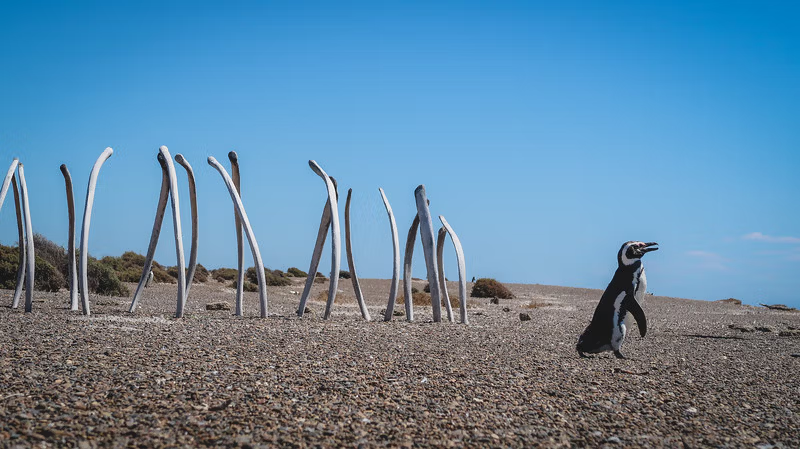
Driving out to Península Valdés
While it’s perfectly feasible to rent a car and drive out to Península Valdés, we opted to take a tour. I always find driving in a new country a little nerve-wracking, so a small guided tour out of Puerto Madryn was a good fit for us.
We were picked up from our hotel shortly past 8:00 in the morning, said hello to our 12 fellow passengers, and started the drive out towards the peninsula. It would be a 400-kilometre journey that day – 200 kilometres on paved roads and another 200 kilometres on dirt roads. Hello road trip!
It was about 1 hour of driving before we reached the entrance to the park which is a protected area. The cost was $650 (ARS) for foreign visitors, $330 for Argentines, and $100 for residents of the province of Chubut.
Shortly after paying our admission fee, we stopped at the Istmo Ameghino Interpretation Centre, which is a bit like a small museum that serves as an introduction to the local biodiversity on the peninsula with accompanying facts about each species, their behaviour and migration patterns.
There were two central displays that really captured our attention: the massive skeleton of a 2-year old whale, and the skull of an orca, better known as a killer whale, complete with a set of sharp pearly whites.
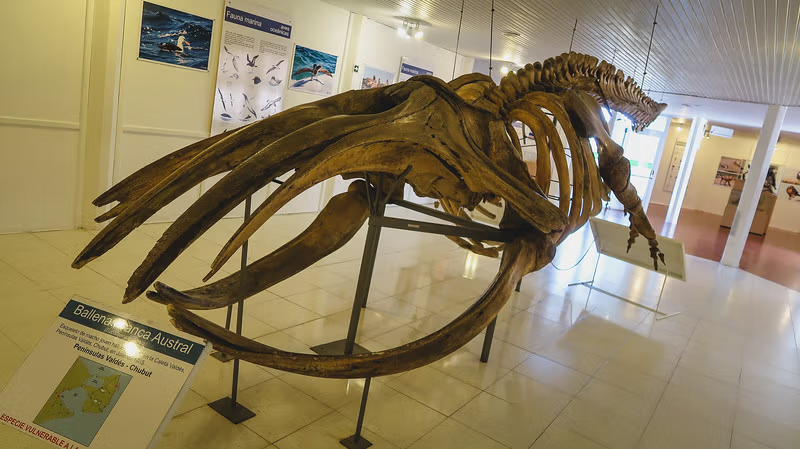
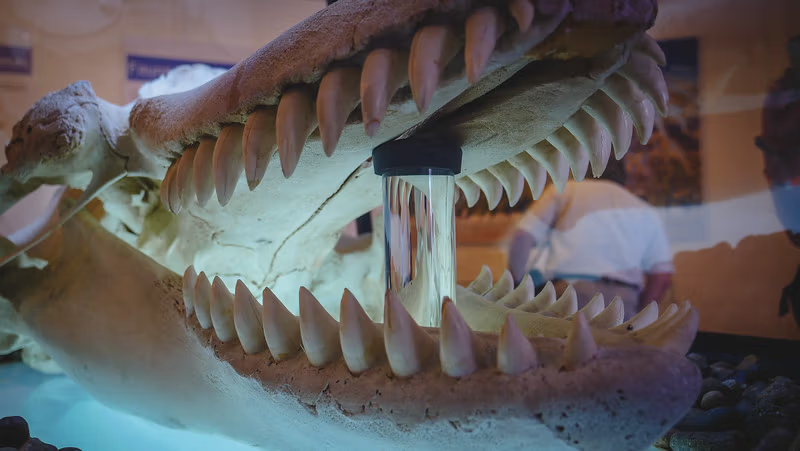
After touring the interpretation centre, we climbed up to the lookout point for some photos, and then it was time to hit the road again on our quest to view wildlife. Well, it wasn’t long before we started seeing guanacos – lots and lots of guanacos!
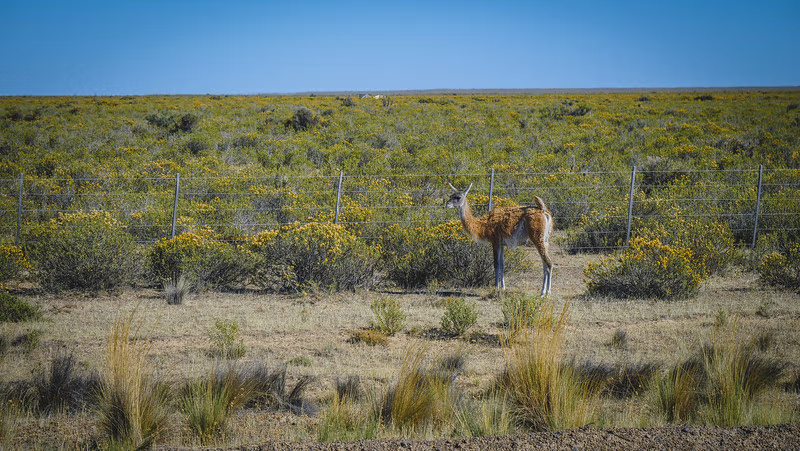
Camera shutters started going off as our guide and driver brought the bus to a halt. “Don’t worry, you’ll see so many guanacos on the peninsula that you won’t even be reaching for your camera by the end of the day,” she told us. But still, we clicked away, because it’s not every day you get to see guanacos hopping over fences in search of greener pastures and fresh water. We also learned that the baby guanacos are called chulengos – how cute is that?
Sea lions & elephant seals at Punta Norte
After a bit more oooh-ing and ahhh-ing at the guanacos, we reached Punta Norte.
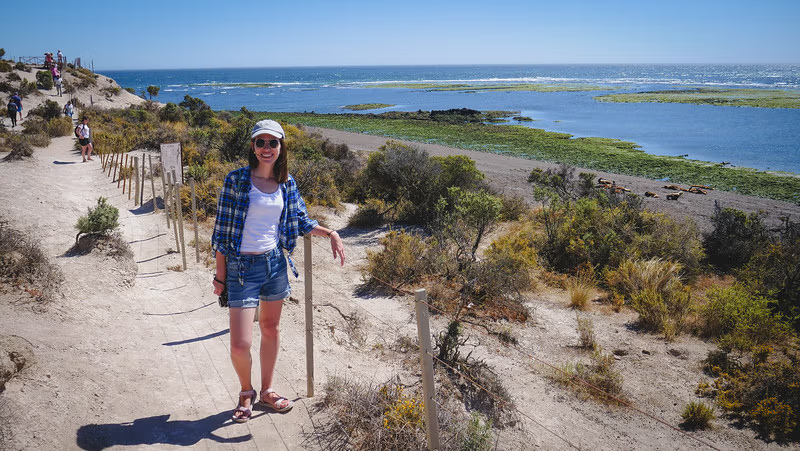
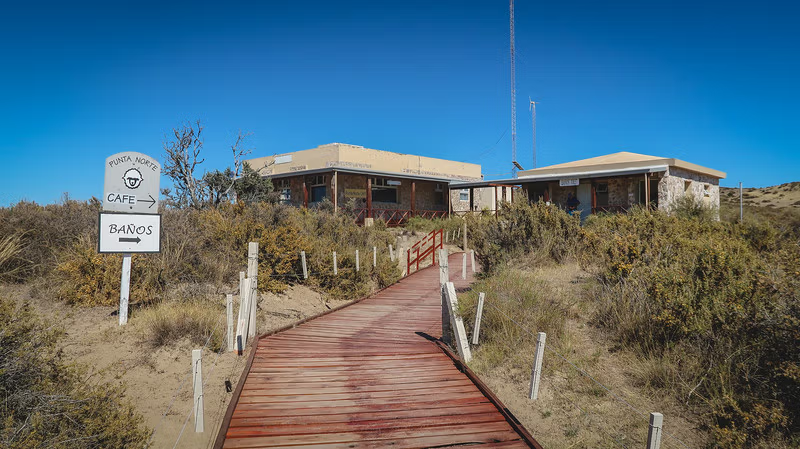
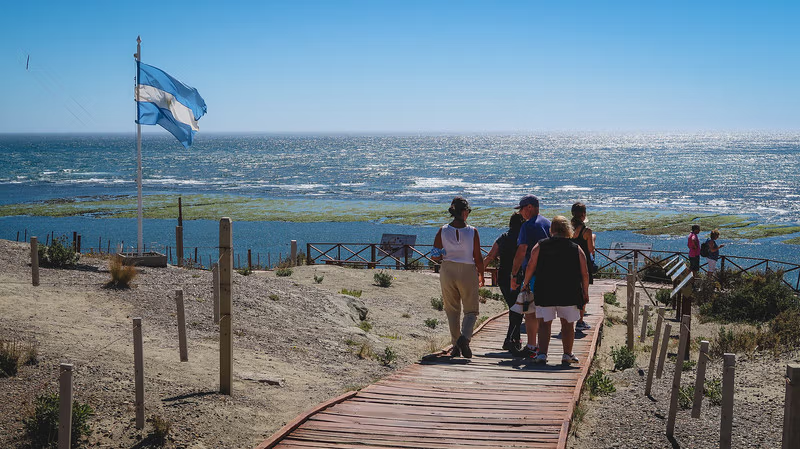
We followed the boardwalk to the edge of the bluffs and there before us lay countless sea lions basking in the sun. We visited in mid-February so there were lots of pups playing in the water and familiarizing themselves with their surroundings. It was so fun to watch, especially because the sea lions make the funniest of sounds – sometimes they sounded like bahhh-ing sheep and other times like screeching dinosaurs!
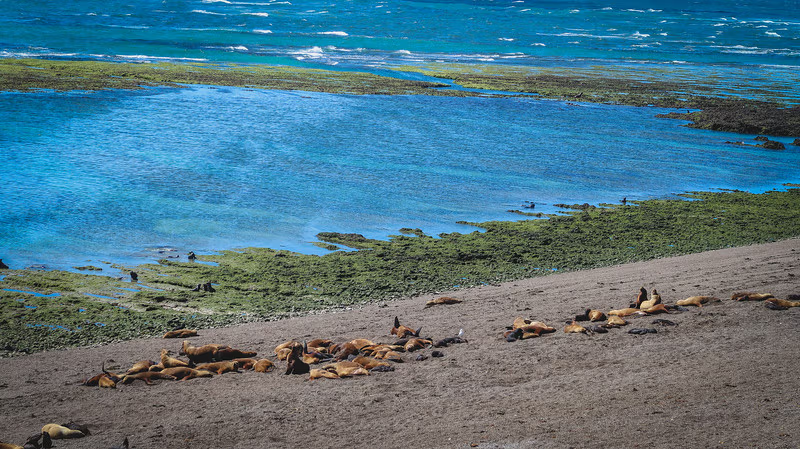
There was a group of elephant seals a bit further down the beach, but it was a much smaller group as it was towards the end of the season for them.
As a tip, if you enjoy photographing wildlife, this is one place where you’ll want to bring a zoom lens as you do view the animals from a bit of a distance so as to not disturb them.
Lunch at Estancia San Lorenzo
From there, we continued on to Estancia San Lorenzo for lunch – something that Sam and I had been very much looking forward to!
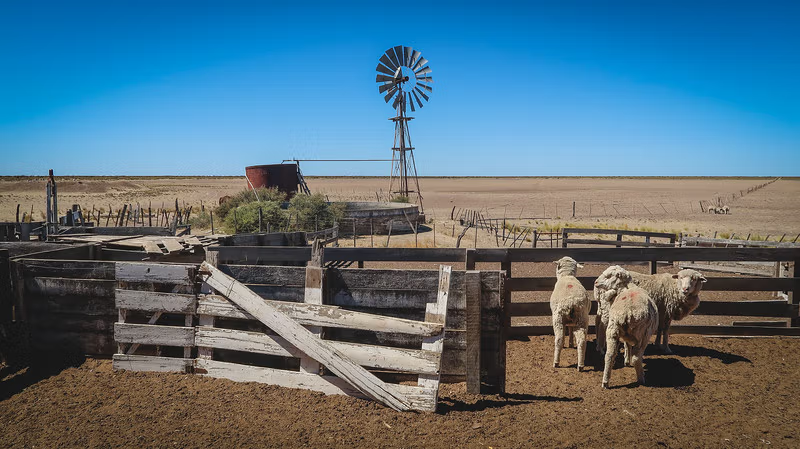
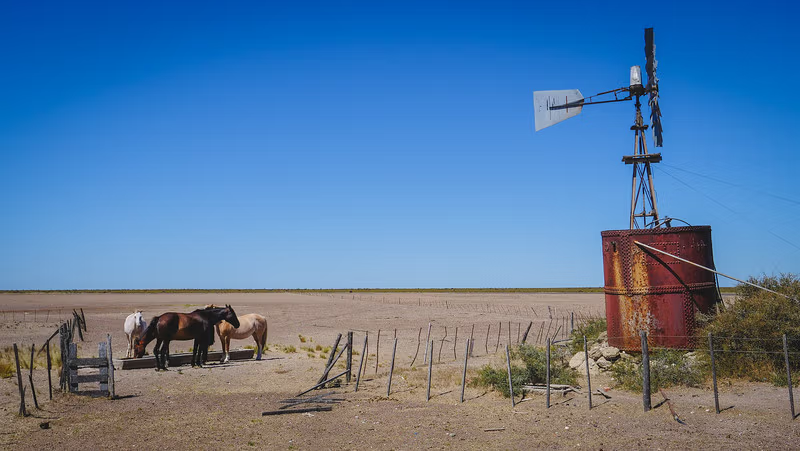
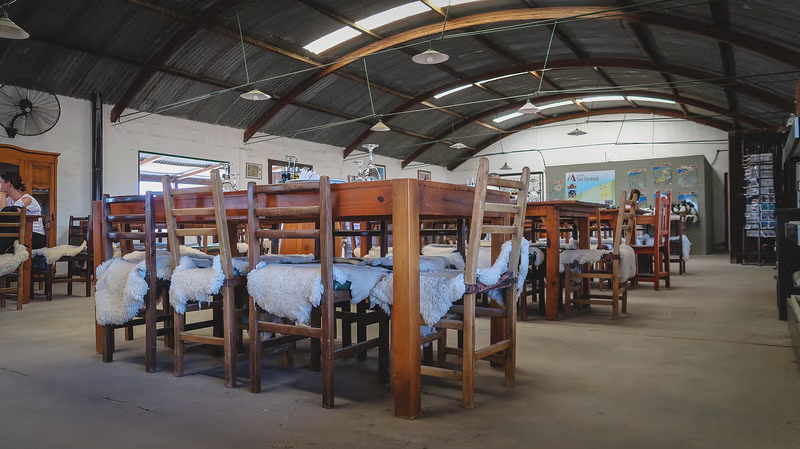
Since we were in Patagonia, we decided to order the Patagonian lamb that had been highly recommended to us. We opted for the set meal which came with empanadas as a starter, followed by a platter with various cuts of lamb alongside a salad, and then a flan with dulce de leche for dessert.
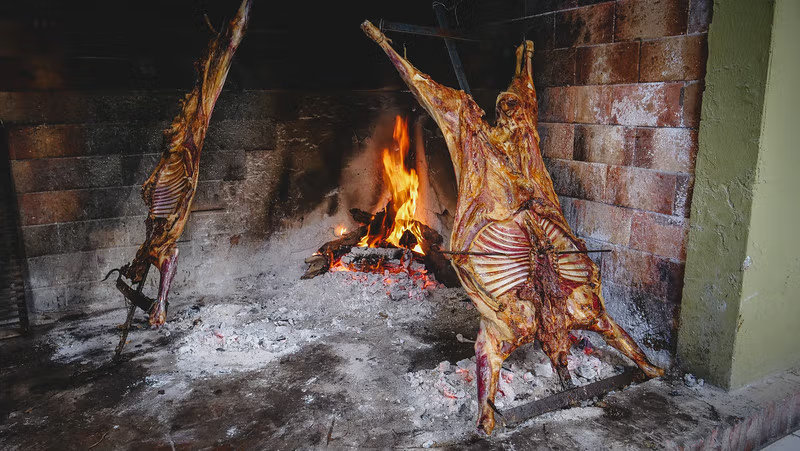
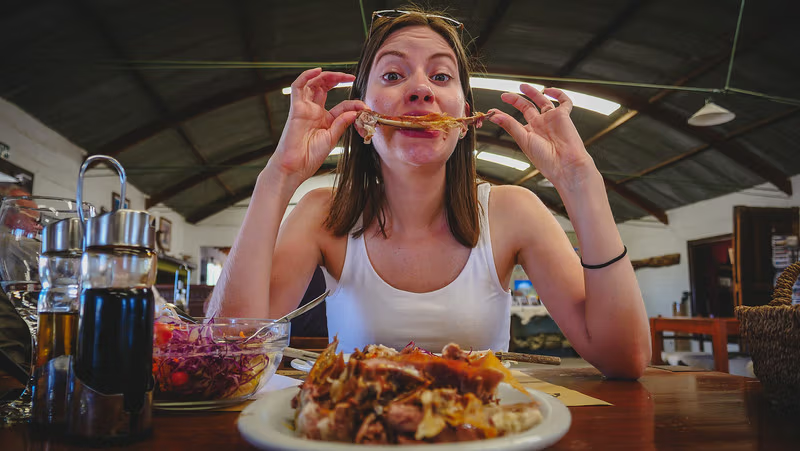
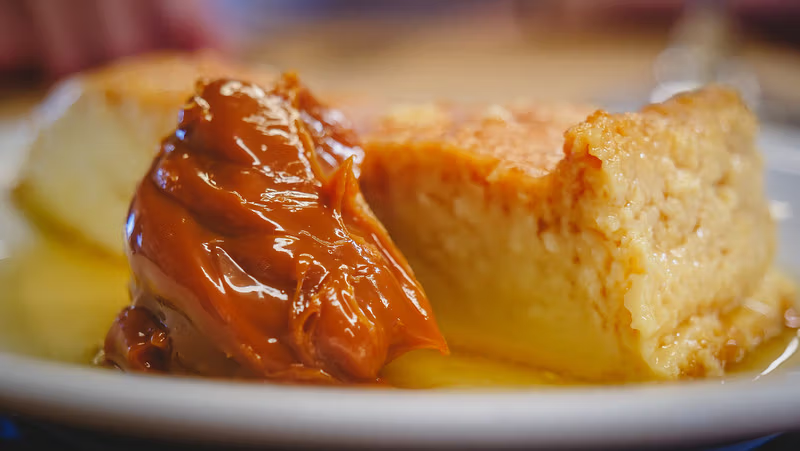
The lamb was wonderful! Our guide explained that the lamb from the peninsula has a very distinct flavour. Because the salt air permeates the vegetation the sheep feed on, that gives the meat a subtle saltiness. Now, I couldn’t tell you how much salt was added while the lamb was cooking, but it definitely was salty, juicy and delicious! The real highlight were the ribs with crispy bits of meat which we picked clean.
The biggest Magellanic penguin rookery
After that meal, it was time to hop aboard the bus and go in search of penguins!
Thankfully, we didn’t have to drive very far as the penguin colony we were visiting is located on private land belonging to Estancia San Lorenzo. We followed a dirt trail out towards the coast and it wasn’t long before we started seeing penguins out the window.
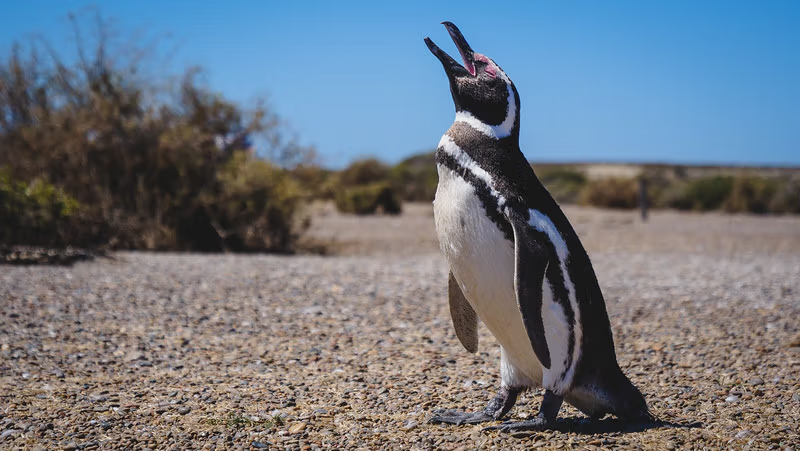
Once we were out of the car, our guide pointed out a carefully marked trail running through the penguin colony. The path to follow was marked with white stones, but we were reminded that penguins always have the right of way and that we needed to keep at least a metre’s distance as they waddled about.
Once we got on the trail, we saw so many penguins in their nests which they build in burrows and under bushes. It was a hot summer’s day and the ones that weren’t seeking shade in their nests were down at the beach.
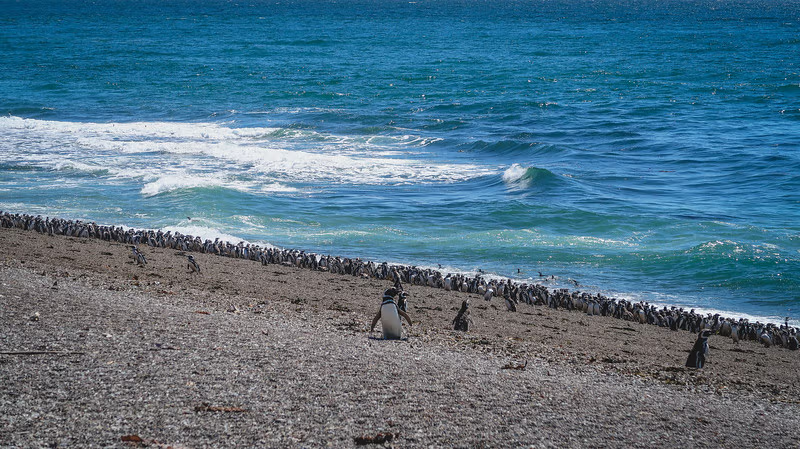
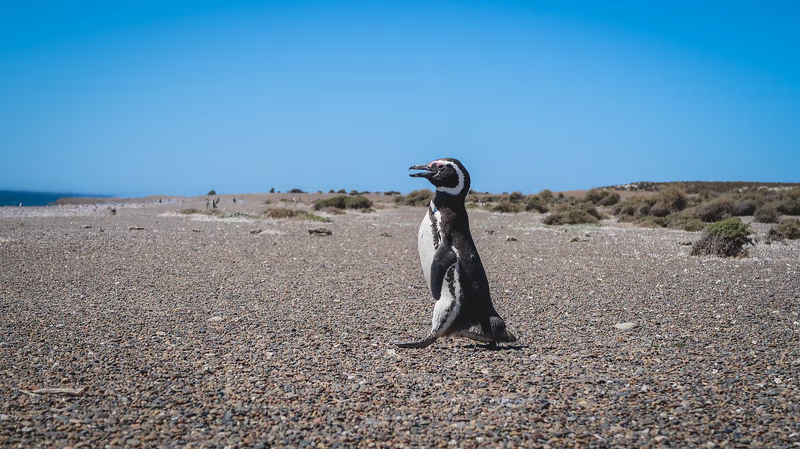
It was here at Punta Norte where we learned that this is currently the biggest penguin rookery in the world. Punta Tombo had that title for a while, but recently up to 150,000 Magellanic penguin nests were counted on these shores, so that means 300,000 mating penguins, and that doesn’t even take into account the younger penguins who need to reach the age of 4-5 years old before they begin mating.
That’s a lot of penguins!
I didn’t realize the magnitude of that number until we reached a lookout point and we saw tens of thousands of penguins lining the pebbly shores as far as the eye could see!
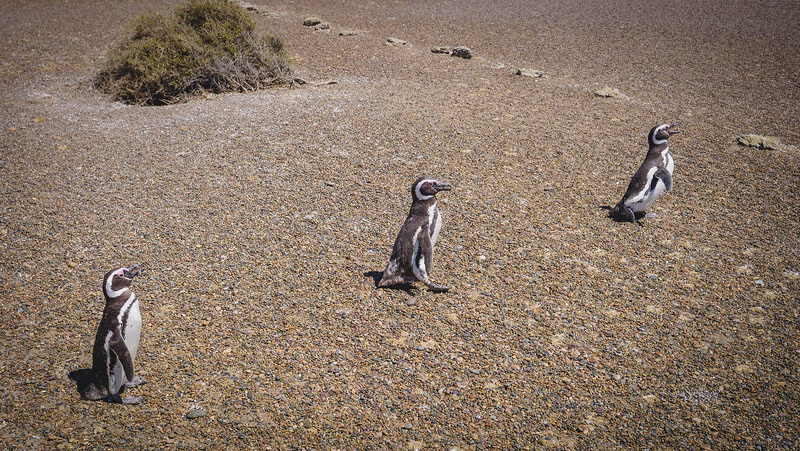
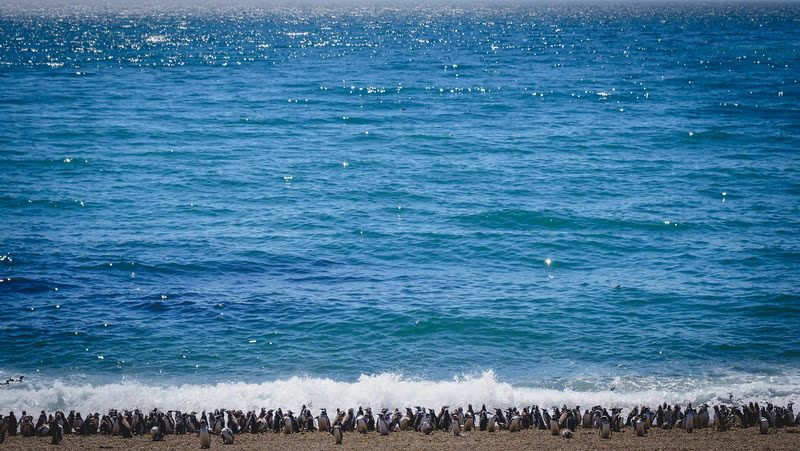
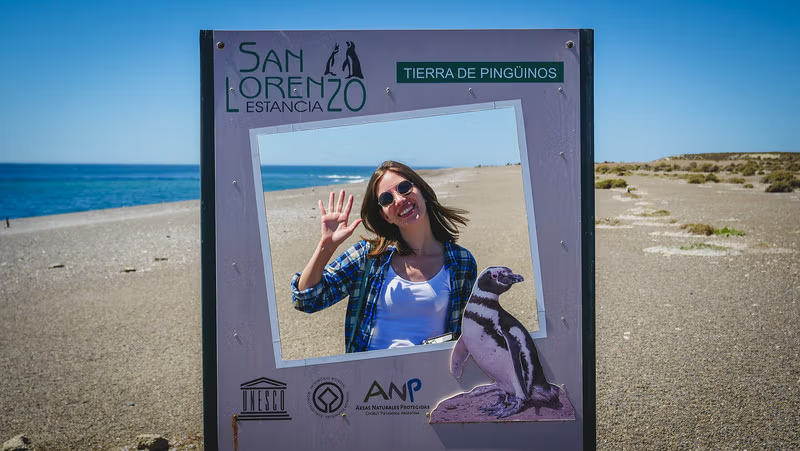
We also learned that Magellanic penguins live about 25 years in the wild and up to 30 years in captivity, but not too long ago a 33-year-old penguin was tracked on these very shores – the senior of the colony!
This stop was the highlight of my day. There’s nothing like waddling penguins to put a smile on your face.
A quick stop in Puerto Pirámides
After visiting Punta Norte, we drove to the hippie beachside town of Puerto Pirámides, which just so happens to be the only town on Península Valdés!
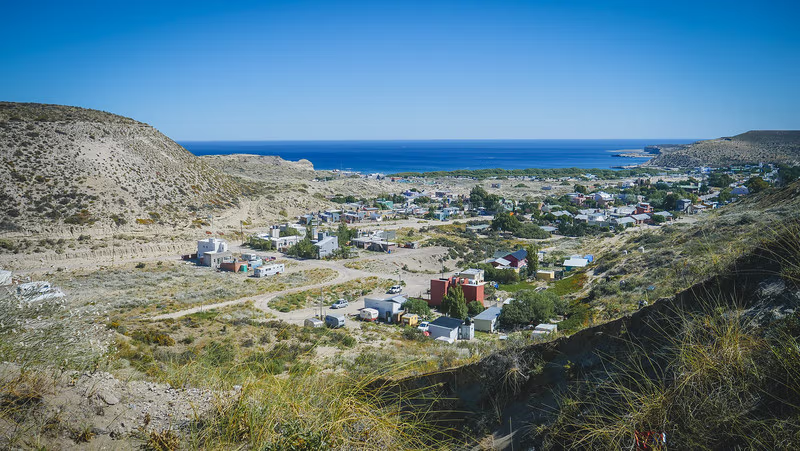
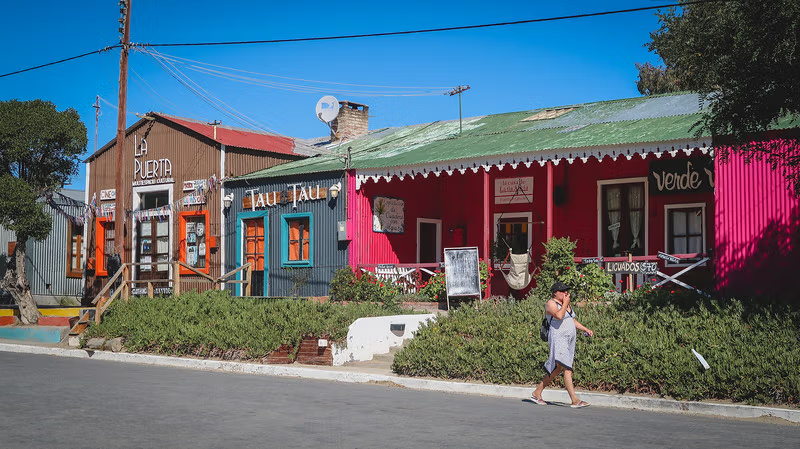
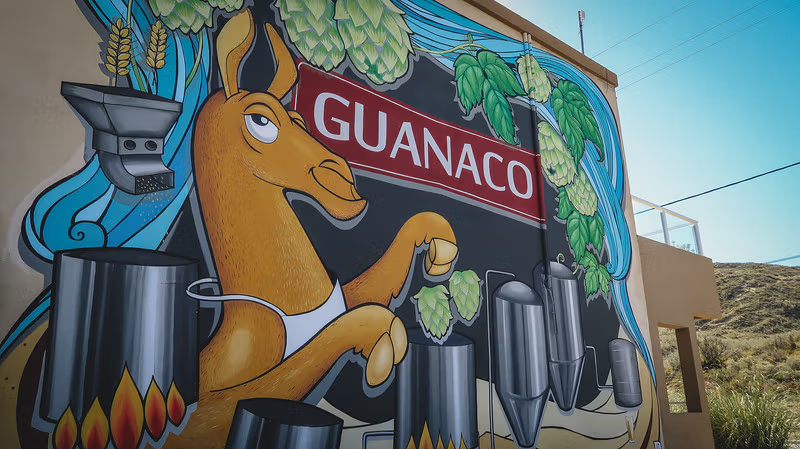
We were given about 30 minutes to wander the colourful little town – most people opted for cool drinks and ice cream since we visited on one of the hottest days of the year! – and then it was time for the group to return to Puerto Madryn.
This is the part where Sam and I bid our group farewell since we’d be staying in Puerto Pirámides and exploring Punta Delgada and Caleta Valdés over the next 2 days. More wildlife, magical sunrises, and scenic hikes to come, but for now, here’s a video of our first day on the peninsula!
Have you visited Península Valdés?
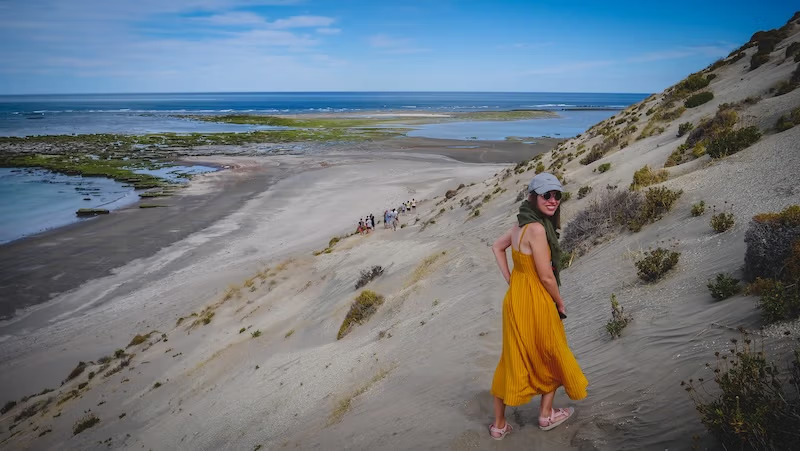
Plan Your Perfect Punta Norte Day (Routes, Wildlife Windows, Costs & Practical Tips)
The One-Day at a Glance (Realistic Pace)
Morning
- 07:30–08:30 Depart Puerto Madryn (or Puerto Pirámides if you’re already inside the park).
- +1 hr Stop at Istmo Ameghino Interpretation Centre for the quick intro + lookout.
- Late morning Continue to Punta Norte: boardwalks, sea lions year-round, elephant seals (seasonal), orca “season” (spring/autumn, more on that below).
Lunch
- Early afternoon Drive to Estancia San Lorenzo for Patagonian lamb (or veggie options) with time to stroll the ranch buildings.
Afternoon
- Penguin colony walk on the estancia’s private land (clearly marked trail; penguins cross first, always).
- Return via Puerto Pirámides for a cool drink, beach views, or a sleepover if you’re continuing deeper into the peninsula the next day.
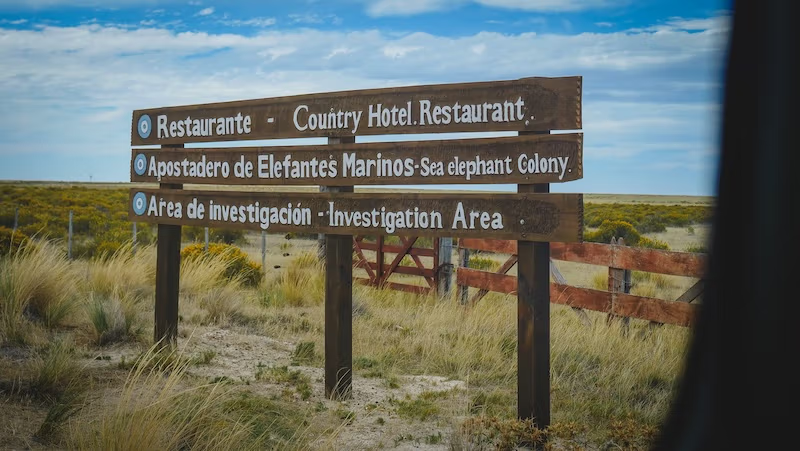
Getting There: Guided Tour vs. Self-Drive
Which is better for you? Here’s a quick comparison:
| Factor | Guided Day Tour | Self-Drive |
|---|---|---|
| Stress level | Low – you nap between stops | Medium – gravel, wildlife on roads, navigation |
| Wildlife intel | High – guides radio each other for sightings | Variable – you’re on your own |
| Flexibility | Fixed schedule, shared with group | Total freedom to linger/chase different light |
| Cost (per person) | Good value for solo/duo travellers | Better value for families/groups |
| Access | Some tours add private access or timed entry | You decide your route, but may need to pre-book lunch/colony slots |
| Photography | You get expert tips + spotting help | You control where/when you stop (golden hours!) |
Road Notes (because this is Patagonia!)
- You’ll split your day between paved and rippled gravel (ripio). Speeds are lower than you think (and should be).
- Wildlife doesn’t read road signs: guanacos, choiques (rheas), maras (Patagonian “hares”) and armadillos may wander across.
- Check the Península Valdés ranger post for any closures, wind advisories, and updated wildlife notes before you set off.
- Fuel up in Puerto Madryn or Trelew. Inside the park, services are limited to Puerto Pirámides (and hours can be seasonal).
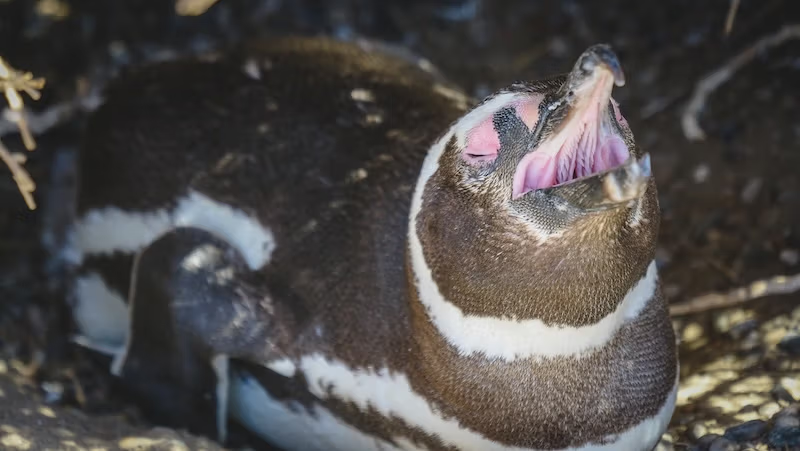
Wildlife Windows: What You Can See and When
While nature keeps her own calendar, here’s a friendly, seasonal cheat sheet to set expectations:
| Month | Sea Lions | Elephant Seals | Magellanic Penguins | Southern Right Whales | Orcas |
|---|---|---|---|---|---|
| Jan–Feb | Pups learning to swim; very active | Smaller numbers (season tail) | Adults + chicks near nests and shore | Peak season is later; occasional offshore spouts | Occasional (tide-dependent) |
| Mar–Apr | Colonies still visible | Sparse | Many head to sea by Mar/Apr | Not typical | Higher chance (not guaranteed) |
| May–Jun | Present but quieter | Minimal | Gone | Arrivals begin (builds to peak) | Rare |
| Jul–Aug | Present | Breeding begins | Not present | Strong season off Puerto Pirámides | Rare |
| Sep–Oct | Active | Present | Prime nesting (huge numbers Oct/Nov) | Peak whale watching | Spotting season (esp. Mar/Apr & Oct) |
| Nov–Dec | Pups + parents | Present | Chicks visible; busy beaches | Fading | Occasional |
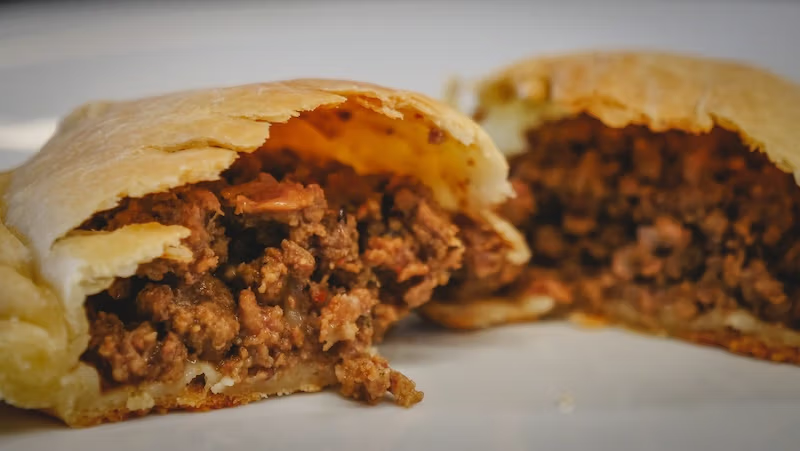
Estancia San Lorenzo: Lunch, Penguins & Etiquette
What makes this stop special?
- Private land with the world’s largest Magellanic penguin rookery (hundreds of thousands in season).
- Set lunch with local favourites (Patagonian lamb is the star, but ask for vegetarian plates if needed).
- Clearly marked trails through the colony—excellent for photography without disturbing nests.
Etiquette & Safety (for you and the birds)
- Stay on the path. Burrows can collapse under human weight.
- Hold a minimum 1 m distance. If a penguin chooses your shoes as a landmark, remain calm and let them pass.
- No food sharing (penguins have their own fishy menu).
- No drones unless you have explicit, written permission (most sites prohibit them).
- Sun & wind are real: hat, sunscreen, and layers keep you cheerful and penguin-patient.
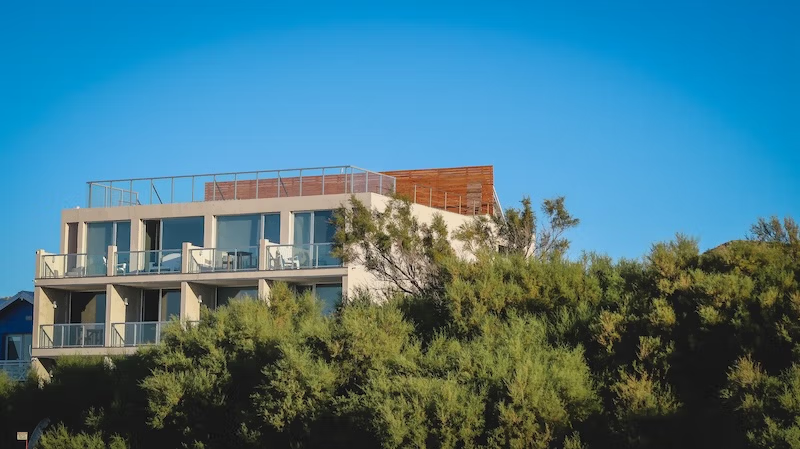
Where to Base: Puerto Madryn vs. Puerto Pirámides
| Base | Vibe | Drive Time to Punta Norte | Food & Services | Best For |
|---|---|---|---|---|
| Puerto Madryn | Beach city, full services, lots of tours | ~2.5–3 hrs (including gravel) | Supermarkets, ATMs, restaurants | Short stays, more hotel choice, non-drivers |
| Puerto Pirámides | Tiny seaside town inside the park | ~1.5–2 hrs | Seasonal hours; a few restaurants, tours | Dawn/dusk light, whale season stays, slow-travel feels |
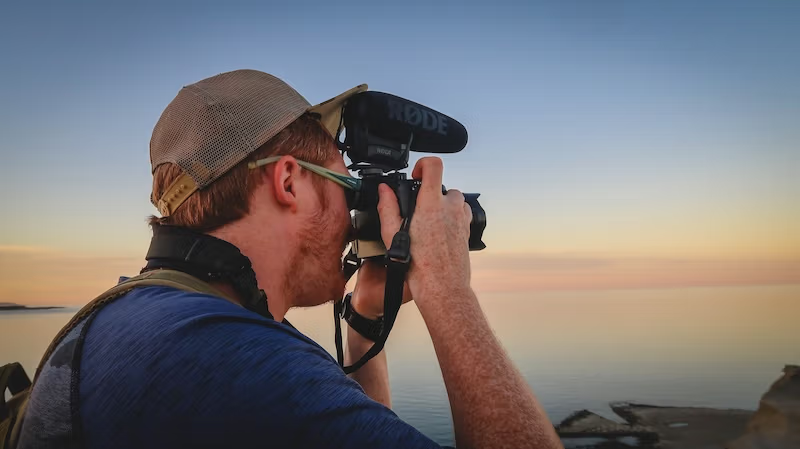
What to Pack: Patagonia Day-Trip Checklist
Essentials
- Windproof layer + light fleece (you’ll thank yourself on blustery bluffs).
- Sun protection: hat, SPF 50, sunglasses (summer sun is intense).
- Closed-toe shoes with tread (pebbly, dusty paths).
- 2 L water per person (minimum) + reusable bottle.
- Snacks (nuts, fruit, biscuits) to bridge lunch and late afternoon.
- Cash (park entry, small purchases, occasional card outages).
- Passport/ID for park entry.
- Basic first aid: blister plasters, antihistamine, pain reliever.
Nice-to-Haves
- Scarf/buff for dust.
- Compact rain shell (showers roll through quickly).
- Mini towel/wipes (dust everywhere, lamb ribs are glorious).
- Dry bag for camera in wind-blown sand.
- Headlamp if staying for sunset/stargazing around Pirámides.
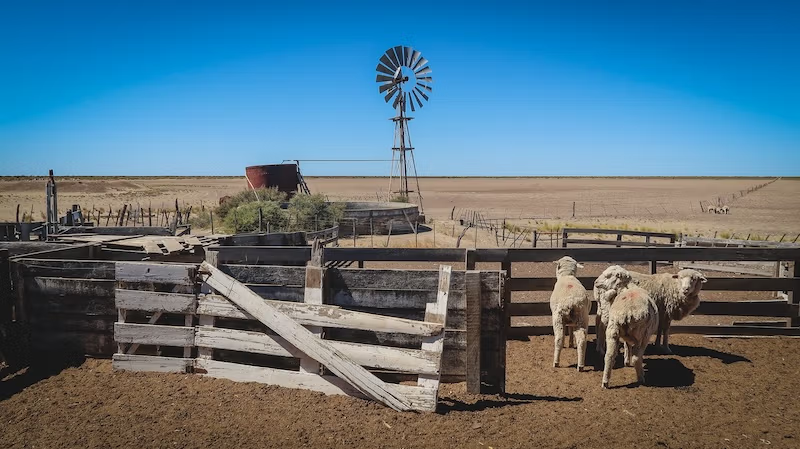
Sample Costs & Budgeting (Per Person, Indicative)
- Park entry fee: variable; expect a tiered price for foreigners/nationals/residents.
- Guided full-day tour: typically US$80–160 depending on inclusions (lunch, language, group size).
- Self-drive fuel + wear: US$25–40 for the loop, plus car rental.
- Lunch at estancia: US$20–40 for set menus; à la carte varies.
- Snacks/coffee/ice cream: US$5–10.
- Optional add-ons: short boat tours (seasonal), souvenirs, tips.
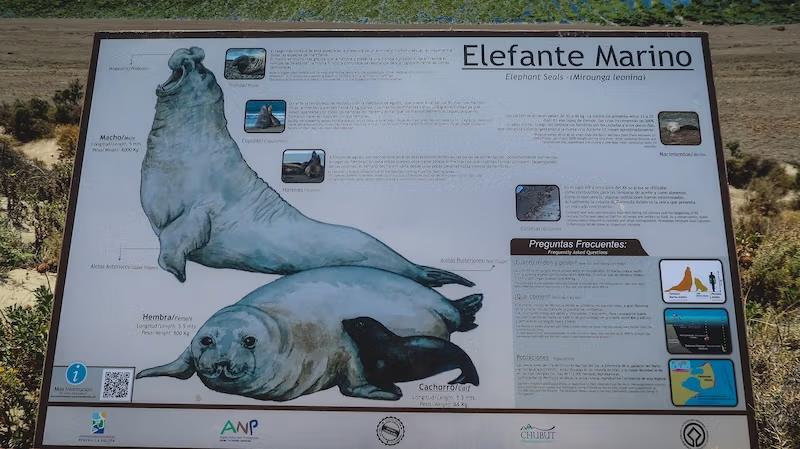
Responsible Wildlife Watching: Gentle Rules that Matter
- Distance is respect. If an animal changes behaviour because of you, you’re too close.
- Quiet wins. Loud calls and clapping stress colonies (and spook your best shot).
- Leave no trace. Pack all waste out; microplastics + wind = bad combo.
- Stay on designated paths—every footprint off-trail compresses fragile habitat.
- No feeding. “Just a crumb” trains wildlife to beg near roads and people.
Easy Add-Ons If You Have Another Day
- Caleta Valdés: long, scenic spit with elephant seals and boardwalk lookouts.
- Punta Delgada: dramatic cliffs, lighthouse lunch, more elephant seals.
- Whale watching (seasonal): Puerto Pirámides is the go-to for Southern right whales (May–Dec, with a Sept/Oct peak).
- Punta Loma: snorkel with sea lions (a separate reserve near Puerto Madryn).
Spanish Mini-Phrasebook (Useful & Friendly)
- ¿A qué hora abre/cierra? – What time do you open/close?
- Dos entradas, por favor. – Two tickets, please.
- ¿Se puede pagar en efectivo o tarjeta? – Can I pay cash or card?
- ¿Dónde está el sendero? – Where is the trail?
- ¿Hay baños? – Are there bathrooms?
- Gracias por la visita, estuvo hermoso. – Thanks for the visit, it was beautiful.
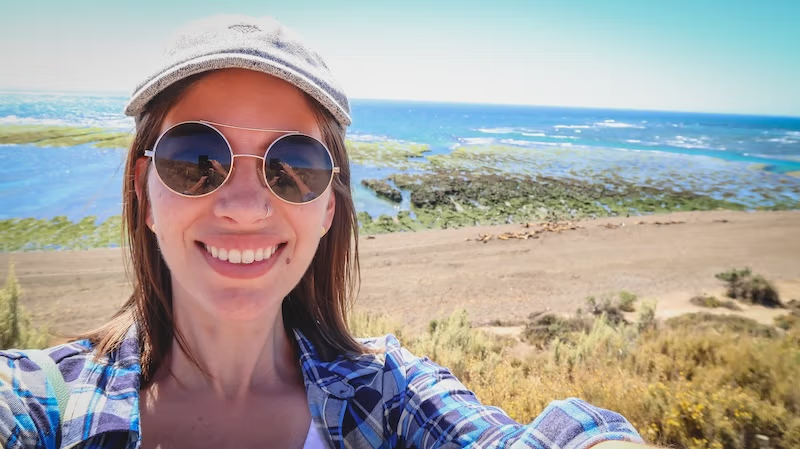
12-Question FAQ: Península Valdés, Punta Norte & Estancia San Lorenzo
How close do you get to the animals at Punta Norte?
You’ll view from boardwalks and fenced lookouts to protect both the colonies and visitors. A zoom lens or binoculars makes a big difference, but you still get fantastic, unhindered views—including pups learning to swim just offshore.
Can I visit the penguin colony at Estancia San Lorenzo without lunch?
Yes—lunch and colony access are separate. In high season, slots can sell out, so pre-book both if possible. If you’re not hungry, you can pay only for the colony entrance and walk the trails.
Is the penguin trail suitable for kids and seniors?
Generally yes. The path is flat and clearly marked with white stones. Expect sun, wind, and pebbles, so pack water, hats, and closed-toe shoes. Take it slow and rest on benches/lookouts.
Are there bathrooms at the main stops?
Yes at the Interpretation Centre, Punta Norte, and Estancia San Lorenzo. Facilities are basic inside the park—use them when you see them and carry a small toilet kit (tissues/hand gel).
What should I do if a penguin approaches me on the trail?
The golden rule is penguins first. Stand still, give it room, and let it waddle by. Don’t crouch into burrows for photos, don’t reach for them, and avoid blocking their route to the sea.
Can I fly a drone over the penguin rookery or sea lion colonies?
No—drones are typically prohibited in protected areas and near wildlife colonies without explicit written permits. Noise and shadows disturb animals. Leave the drone behind and focus on ground-level magic.
Is it worth staying in Puerto Pirámides instead of doing a long day trip?
If you’re chasing sunrise/sunset light, starry skies, or whale season (May–Dec), yes—stay a night or two. For short itineraries with more services and dining variety, Puerto Madryn makes a good base with early day tours.
What lens should I bring if I only want to carry one?
A 70–300mm (on crop sensor) or 100–400mm (on full-frame) covers sea lions, penguins, and distant shoreline action nicely. Pair it with a wide angle on your phone for landscapes and group shots.
Will I see orcas at Punta Norte?
Maybe. Orca sightings are rare and tide-dependent; the best windows are spring and autumn around high tide, but it’s never guaranteed. Go for sea lions + penguins, and treat any dorsal fins as a once-in-a-lifetime bonus.
Is swimming allowed at Punta Norte or Estancia San Lorenzo?
No. These are wildlife zones with strong currents and protected colonies. If you want a dip, head to Puerto Pirámides’ beach when conditions are suitable—or choose a snorkel with sea lions at Punta Loma (book separately).
Do tours run in bad weather?
Patagonian weather is changeable. Light rain and wind rarely cancel day trips; severe wind may close some lookouts or delay travel. Layer up, pack a shell, and follow your guide’s advice.
What payment methods are accepted inside the park?
Bring cash (Argentine pesos) for park entry and small purchases. Some restaurants and shops take cards, but signals can be patchy, especially on windy days. If paying a tour operator, clarify the payment method in advance.

Thank you, Audrey, for sharing your experience about Peninsula Valdes. I hope you have enjoyed your trip and especially with penguins.
Hey Audrey Begner,
Your travel and guide to Península Valdés, Argentina is captivating and worth pondering over and over. The penguins? Intriguing to note that they have right of way. Thanks for the post.
Great article, Audrey. This was the first place I stopped in Patagonia too. Arriving on an overnight bus at about 7am and then booking straight on a tour leaving 20 minutes later on the promise of seeing penguins! Definitely worth it. The wildlife was so varied in this part of Patagonia.